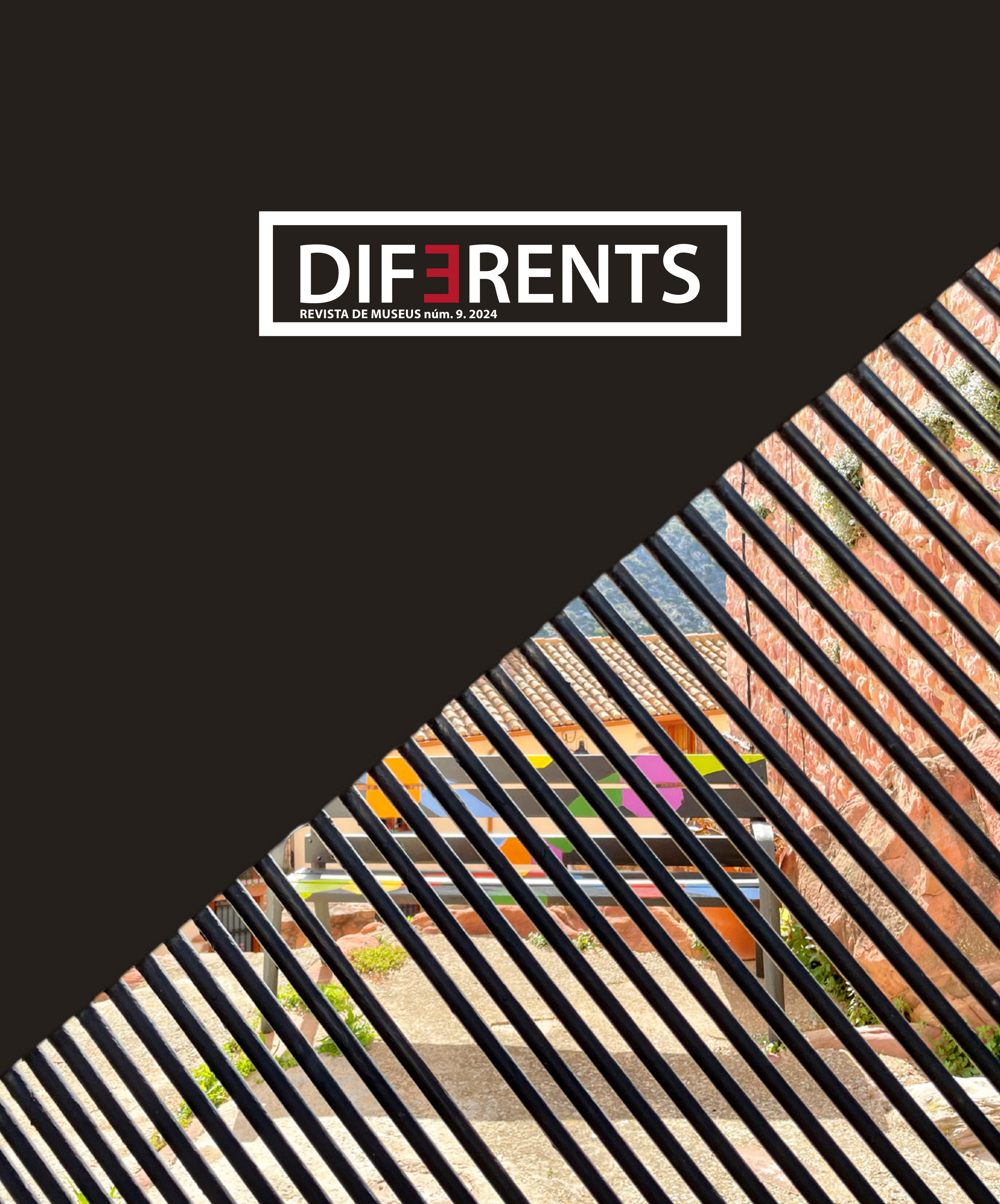Observar, tocar, mesurar i descriure la rellevància del Museu en el desenvolupament experimental de la Ciència i la Història
##plugins.themes.bootstrap3.article.main##
Resum
Aquest article es basa en una reflexió sobre l'origen i l'evolució dels museus al llarg de la Història. Sosté que els museus no són necessàriament el resultat d'una evolució lineal des de les Cambres de les Meravelles fins als Museus Nacionals, sinó el resultat d'una àmplia competència, tant entre diferents entitats polítiques com entre diferents projectes epistemològics. D'una banda, l'evolució de la ciència i el desenvolupament de la teologia cristiana es van combinar en una fascinació per l'acumulació i descripció d'objectes. D'altra banda, la pròpia transformació de la Història i l'Arqueologia, com a disciplines dirigides per la cultura material, va alimentar una concepció científica del Museu. D'aquesta manera , l'article identifica una línia fonamental en el sorgiment del Museu: la protecció dels objectes/relíquies, no sols com a memòria del passat, sinó com a pont entre el passat i el futur, on el nou, el desconegut, altres cultures i les noves creacions artístiques van ampliar constantment l'univers conceptual de les Humanitats.
Descàrregues
##plugins.themes.bootstrap3.article.details##
Referències
Alexander, Edward & Mary Alexander (2008) Museums in Motion. An introduction to the history and Functions of Museums, Plymouth: AltaMira Press.
Bartlett, Robert (2013) Why Can the Dead Do Such Great Things? Saints and Worshippers from the Martyrs to the Reformation, Princeton: Princeton University Press.
Baudrillard, Jean (1991) Simulacros e simulação, Lisboa: Relógio d’água.
Bennett, Tony (1995) The Birth of the Museum: History, Theory, Politics, London: Routledge.
Bennett, Tony (1998) «The Exhibitionary Complex», New Formations, 4: 73-102.
Blom, Philipp (2013) El coleccionista apasionado. Una historia íntima, Madrid: Anagrama.
Boas, Franz (1907) «Some Principles of Museum Administration», Science, 25 (650): 921-933.
Bredekamp, Horst (1995) The Lure of Antiquity and the Cult of the Machine: The Kunstkammer and the Evolution of Nature, Art and Technology, Princeton: Markus Wiener Publishers.
Carbonell, Charles-Olivier (2002) L’historiographie, Paris: puf.
Carvalho Amaro, Gonçalo (2015) Pessoas, Objectos e Sentimentos. Ensaios e Reflexões sobre a Construção Social do Património, Lisboa: Colibri.
Choay, Françoise (2007) Alegoría del Patrimonio, Barcelona: Editorial Gustavo Gili.
Daston, Lorrain (ed.) (2017) Science in the Archives, Pasts, Presents, Futures, Chicago: University of Chicago Press.
Diaz-Andreu, Margarita (2007) A World History of Nineteenth-Century Archaeology: Nationalism, Colonialism, and the Past, Oxford: Oxford University Press.
Eco, Umberto (2014) From the Tree to the Labyrinth, Harvard: Harvard University Press.
Evans, Robert & Alexander Marr (eds.) (2016) Curiosity and wonder from the renaissance to the enlightenment, London & New York: Routledge.
Ferrari, Giovanna (1987) «Public Anatomy Lessons and the Carnival: The Anatomy Theatre of Bologna», Past and Present, 117: 50-106.
Findlen, Paula (1994) Possessing Nature, Museums, Collecting, and Scientific Culture in Early Modern Italy, Berkley: University of California.
Fraser, John (2019) «A Discomforting Definition of Museum», Curator The Museum Journal, 62 (4): 501-504.
Gilaranz Ibañez, Ainhoa (2019/2020) «Patrimonio, nación y museos: un recorrido por más de doscientos años de historia», Museos.es, 13-14: 26-41.
Ginzbourg, Carlo (1980) The Cheese and the Worms: The Cosmos of a Sixteenth Century Miller, Baltimore: Johns Hopkins University Press.
Ginzbourg, Carlo (2000) Relações de Força, História, Retórica, Prova, São Paulo: Companhia das Letras.
Grysells, Guido (2021) «African cultural heritage: reconstitution and restitution», Boletim do ICOM Portugal, série III, núm 17: 156-161.
Hazard, Paul (1961) La crise de la conscience européenne 1680-1715, Paris: Fayard.
Ingold, Tim (2007) «Materials against materiality», Archaeological Dialogues, 14 (1): 1-16.
Lains, Pedro (2005) «A indústria», en Lains, Pedro & Álvaro Ferreira da Silva (eds.) (2005) História Económica de Portugal, 1700-2000, Lisboa: Imprensa de Ciências Sociais, 259-282.
Latour, Bruno (2005) Reassembling the Social: An Introduction to Actor-Network-Theory, Oxford: Oxford University Press.
Levi-Strauss, Claude (1983) Le Regard Éloigné, Paris: Plon.
Lipovetsky, Giles (1989) O Império do Efémero. A moda e o seu destino nas sociedades modernas, Lisboa: Dom Quixote.
Margocsy, Dániel (2014) Commercial Visions Science, Trade, and Visual Culture in the Dutch Golden Age, Chicago: University of Chicago Press.
Messbarger, Rebecca (2010) The Lady Anatomist, The Life and Work of Anna Morandi Manzolini, Chicago: University of Chicago Press.
Merton, Robert & Elinor Barber (2006) The Travels and Adventures of Serendipity: A Study in Sociological Semantics and the Sociology of Science, Princeton: Princeton University Press.
Mirzoeff, Nicholas (2017) «Empty the museum, decolonize the curriculum, open theory», The Nordic Journal of Aesthetics, 53: 6–22.
Momigliano, Arnaldo (1950) «Ancient History and the Antiquarian», Journal of the Warburg and Courtauld Institutes, 13, núm 3-4: 285-315.
Paglia, Camille (2018) Provocações, Lisboa: Relógio de Água.
Pinto Ribeiro, António (2016) «Podemos descolonizar os museus?» en Ribeiro, António Sousa y Margarida Calafate Ribeiro (org.) (2016) Geometrias da memória: configurações pós-coloniais, Porto: Edições Afrontamento, 95-111.
Pomian, Krzysztof (2020) Le Musée, une histoire mondiale. 1. Du tresór au musée, Paris: Gallimard.
Poulot, Dominique (1997) Musée, nation, patrimoine: 1789-1815, Paris: Gallimard.
Sandhal, Jette (2019) «The Museum Definition as the Backbone of ICOM», Museum International, 71 (1-2): 1-9.
Schouten, Frans (1993) «The Future of Museums», Museum Management and Curatorship, 12 (4): 381-386.
Scheiner, Tereza (2000) «Muséologie et philosophie du changement», Cahier d’étude icom, 8: 22-24.
Sullivan, Richard (1989) «The Medieval Church and the patronage of Art», The Centennial Review, 33 (2): 108–30.
Thomas, Julian (2004) Archaeology and Modernity, London /New York: Routledge.
Van Mensch, Peter (2017) «The Guardian and the Tiger: Reflections on the Sustainability of Heritage», in Meijer-van Mensch, Léontine (ed.) (2017) Collecting & Collections. 2015 COMCOL Annual Conference, Seoul: National Folk Museum of Korea, 38-46.


